Animals United Blu-ray Movie
HomeAnimals United Blu-ray Movie 
Konferenz der Tiere / Blu-ray + DVDArc Entertainment | 2010 | 93 min | Rated PG | Jun 05, 2012
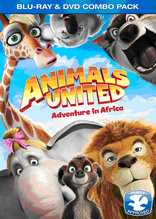
Movie rating
5.9 | / 10 |
Blu-ray rating
| Users | 0.0 | |
| Reviewer | 3.5 | |
| Overall | 3.5 |
Overview
Animals United (2010)
A group of animals waiting for the annual flood they rely on for food and water discover that the humans, who have been destroying their habitats have built a dam for a leisure resort. The animals endeavor to save the delta and send a message to the humans not to interfere with nature.
Director: Reinhard Klooss, Holger Tappe| Family | 100% |
| Animation | 90% |
| Foreign | Insignificant |
Specifications
Video
Video codec: MPEG-4 AVC
Video resolution: 1080p
Aspect ratio: 2.34:1
Original aspect ratio: 2.39:1
Audio
English: DTS-HD Master Audio 5.1
Subtitles
English SDH
Discs
25GB Blu-ray Disc
Two-disc set (1 BD, 1 DVD)
DVD copy
Packaging
Slipcover in original pressing
Playback
Region A (B, C untested)
Review
Rating summary
| Movie | 3.0 | |
| Video | 4.5 | |
| Audio | 4.5 | |
| Extras | 0.0 | |
| Overall | 3.5 |
Animals United Blu-ray Movie Review
A Meerkat Shall Lead Them
Reviewed by Michael Reuben May 20, 2012Anyone who was annoyed at WALL-E's supposedly "anti-consumerist" message or Avatar's "treehugger" subtext should really be offended by Animals United, a feature-length cartoon from German studio Constantin Films. Loosely adapted from a 1949 children's book, The Animals' Conference, which dealt with nuclear disarmament, and released in Germany under the title Konferenz der Tiere, the film is a modern Aesop's fable that isn't shy about delivering an explicit attack on humanity's mistreatment of Planet Earth—accompanied by the usual hijinks and shenanigans that one expects when talking animals are the main characters. Directors Reinhard Klooss and Holger Tappe were sufficiently confident in the film's appeal that they created both a German version for domestic release and an English-language version for international distribution. For the latter, they recruited an array of first-rate vocal talent, mostly British, including Jim Broadbent, Vanessa Redgrave, Stephen Fry, Andy Serkis and, in the lead role of Billy the Meerkat, James Corden. Even though Animals United did respectable box office abroad, it was never released in the United States. Presumably, its distributors looked at the marketing data and concluded that the the film's pro-ecology message wouldn't be well-received in a country that can't even agree on whether human activity contributes to global warming (let alone whether global warming represents a threat). The film has been released directly to video here by ARC Entertainment.
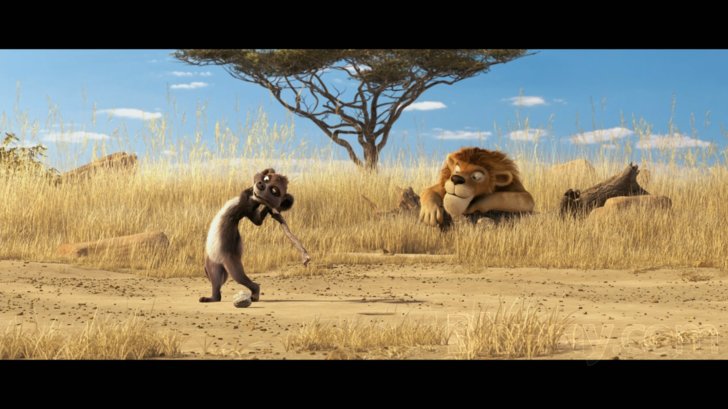
In sequences set all over the world, we see the damage to animals and their habitats caused by human activity, while being introduced to the film's eclectic cast. As is typical of the genre, each species retains a few generic traits, while the rest are anthropomorphized into human alternatives. While glaciers collapse and the ice caps break up around her, a polar bear named Sushi (Bella Hudson) struggles to find an ice flow big enough to support her weight. Meanwhile, a conference on climate change dawdles ineffectually in nearby Greenland. In the Galapagos, two sea turtles, an old married couple, Winifred and Winston (Redgrave and Broadbent), are still devoted to each other after more than 700 years, but they must flee their home after an oil spill that mimics the Exxon Valdez. In Australia, a kangaroo named Toby (Jason Donovan), a Tasmanian Devil dubbed Smiley (Pete Zarustica) and a koala, Ken (Oliver Green), narrowly escape a raging brush fire started by a careless motorcyclist. They decide it's time for a change. (Being Australian, all three of them love beer, which they can only get by raiding human supplies, but never mind.) The most incongruous character, and the one that best demonstrates the depth of the filmmakers' vegetarian convictions (which, for me, is both admirable in its honesty and entertaining in its whackiness) is Charles the rooster—and a French rooster at that. He's voiced by the great verbal chameleon, Andy Serkis, the voice of Gollum in The Lord of the Rings, and we first encounter him as he's about to be beheaded, plucked and served for dinner by a shipboard chef. Since he's French, Charles is a firm believer in liberté, and he jumps ship rather than fall slave to another's appetite. By a few only-in-the-(animated)-movies devices, Charles joins up with other refugees from the disasters previously seen, and the group arrives in the African delta, where the film's main action is set. They think they've arrived in paradise, but they're about to discover differently. The delta menagerie is a picturesque bunch that would never co-habit in nature. Except for the rival herds of rhinos and water buffalo squaring off over control of the local water hole—I couldn't decide whether they more closely resembled street gangs or political parties— most species live in relative harmony. Even the local lion, the appropriately named Socrates (Stephen Fry), has given up eating meat (!) as a result of a youthful trauma suffered while exploring the canyon colloquially known as the Valley of Death (of which more in a moment). Socrates' friend is the meerkat, Billy (Corden), who is the classic everyman hero, an ordinary guy whom most don't take seriously. Billy just wants to be a good husband and father. Assorted creatures like the giraffe Giselle (Lumley), the elephant Angie (French) and an ape named Bongo (Omid Djalili), who fancies himself a hair stylist and has a scam impersonating an "oracle", round out the collection. But the delta is dying, because its water supply has mysteriously disappeared. As the rhinos and water buffalo clash with greater violence over the ever-shrinking water hole, the remaining inhabitants pant with thirst. The arrival of the refugee group internationalizes the problem and leads to a call for action. Billy and Socrates have already ventured into the Valley of Death, from which water always flowed in the past, and they discover a huge obstruction that we instantly recognize as a dam. On the other side are artificially created lakes and ponds that are the foundation for a massive luxury resort, Eden Paradise, built by one Smith (Michael Glover), who is currently seeking new investors. He's also hosting the latest climate change conference, in what is obviously their biggest boondoggle to date. Smith's idealistic daughter, Maya (Kim Holland), sides with the animals, and his club "mascot", a chimpanzee named Toto (yes, Toto; Jason Griffith) suffers from split loyalties, because his secret dream is to be part of an act in Vegas, but he remembers where he came from. Despite logic, species identity and the laws of physics, the animals must unite to bring down the dam and restore water to the delta. They succeed, of course, inspired by a surprisingly effective scene in which Winifred and Winston address the crowd, sharing their insights about humanity gleaned from centuries of observation—or, more accurately, their condemnation. From a "message" perspective, there's much to dispute in the scene, but dramatically it's fascinating. Suppose an animal with such a life span were able to speak with advanced vocabulary, knowledge and logic; who's to say it wouldn't reach the same conclusions as Winifred and Winston? The best dramatists always let their characters articulate a consistent and persuasive point of view, even if it's not the last word. (This is why Shakespeare is so hard to pin down.) If one can step outside the ideological boxes for a few minutes, scenes like this one in Animals United provide the opportunity, to paraphrase Robert Burns, of seeing ourselves as others might see us. Of course, that's for the adults in the audience. Most of the film is for kids. When the Tasmanian Devil is emitting noxious fumes from every orifice (a running gag that gets overdone), or Billy is inventing his own version of golf using a stick and dried hyena "poo-poo", or the animals are evading the stock-villain hunter kept on staff by the hotel management, the target audience is obviously six and under. Still, though Klooss and Tappe never achieve anything like Pixar's level of sophistication—who does?—they throw in unexpectedly clever winks to the adults. When Charles is guiding the refugees across the ocean, he suddenly starts crooning the Charles Trenet standard "La Mer". When Billy is walking along on his quest for water, he breaks into song, but instead of warbling some newly penned ditty aimed at an Oscar nod, he breaks into an updated rendition of the Roger Miller classic, "King of the Road". Both of these caught me so off guard that I started laughing with delight. Sometimes, old songs are the best.
Animals United Blu-ray Movie, Video Quality 
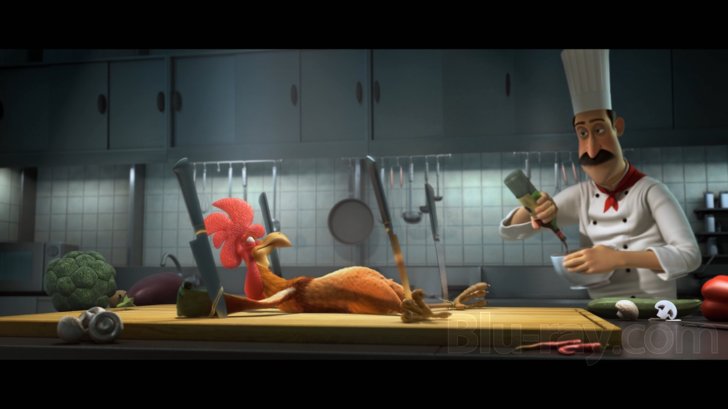
Although Animals United had a relatively modest budget (reportedly somewhere between $40 and $50 million), computer animation has progressed to the point where a lot of value can be created for that amount, if the talent is there. The film's frames may not be as jam-packed with detail as the best of Pixar's creations, but the creatures are sophisticated in their conception and detailed in their realization, and ARC's 1080p, AVC-encoded Blu-ray reproduces all the fine renderings of texture in such demanding areas as fur, moisture, gravel and dirt. Colors are appropriately saturated, blacks are black (the panther in the Valley of Death is especially well-done), and there is no video or other noise to interfere with your viewing pleasure. As with all such digital animation, the Blu-ray was presumably sourced from digital files, thereby ensuring that the end product matches what the animators created. In Europe, Animals United was released to theaters in 3D, and many sequences would obviously benefit from 3D rendering. However, ARC has not announced any plans to release a 3D version.
Animals United Blu-ray Movie, Audio Quality 
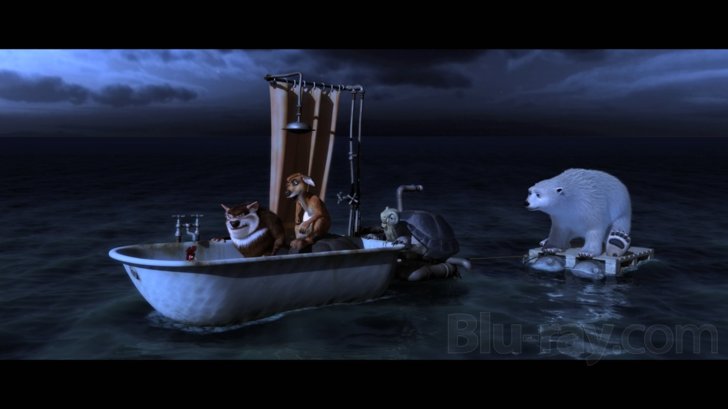
The DTS-HD MA 5.1 track fully utilizes the five channels to immerse the viewer in the film's experience. Discrete effects are plentiful (e.g., beer cans tossed over your shoulder), as are pans (an airplane flying) and all-around activities (stampedes and showdowns between the rhinos and the water buffalos). Bass extension is significant and substantial, because the ground trembles for several reasons, at a number of points in the film. The numerous voice performances, with their wide variety of accents and intonations, are well-reproduced and generally confined to the front center. The underscoring by the prolific David Newman is spread across the soundstage and blended unobtrusively into the background. This may not be the subtlest of soundtracks, but it's effective and professional.
Animals United Blu-ray Movie, Special Features and Extras 

No extras are included.
Animals United Blu-ray Movie, Overall Score and Recommendation 
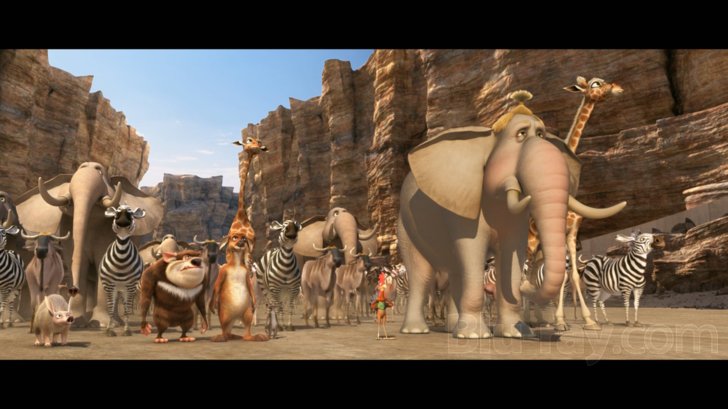
Is Animals United a great animated film? I think Pixar and Dreamworks Animation don't need to start worrying just yet. But there's undeniable craftsmanship behind it, the kind that only improves with subsequent ventures, and next time the subject matter may not be as difficult to sell in an American market. That the film's pro-animal slant would set off ideological trip wires here can be seen in user comments at Amazon and IMDb. I enjoyed it precisely because it played like something that would never have survived a journey through the U.S. studio marketing maw, which almost always aims for blandness. Kids, of course, won't care either way. Recommended, but know what you're getting into.
Similar titles
Similar titles you might also like
(Still not reliable for this title)

A Turtle's Tale: Sammy's Adventures
Sammy's Adventures: The Secret Passage / Sammy's avonturen: De geheime doorgang
2010

Madagascar 3: Europe's Most Wanted 3D
2012

Hotel Transylvania
2012

Khumba 3D
2013

Happy Feet Two 3D
2011

Maya the Bee Movie 3D
2014

Cricket on the Hearth
1967

Cars Toon: Mater's Tall Tales
2008-2010

The Reef
2006

A Turtle's Tale 2: Sammy's Escape from Paradise 3D
Sammy's Adventures 2 / Sammy's avonturen 2
2012

Curious George
2006

Hotel Transylvania 2
2015

Minions
2015

Bolt 3D
Exclusive with Sony HDTVs
2008

The Jungle Book 2
2003

The Boss Baby 4K
2017

Joseph: King of Dreams
2000

Bambi II
2006

Ratatouille
2007

Pixar Short Films Collection: Volume 1
PIXAR
1984-2006